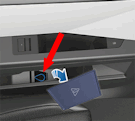Flawed electronic door The electronic lock and latch beat goes on. The parents of Krysta Tsukahara and Jack Nelson have filed lawsuits against Tesla claiming that flawed electronic door designs are responsible for the deaths of the two college students in a burning Cybertruck. The suits, filed in Alameda County Superior Court, Alameda, CA, are …
Tag: latches
Permanent link to this article: https://dashboardsymbols.com/2025/10/well-consumer-reports-was-close/
Permanent link to this article: https://dashboardsymbols.com/2025/10/lawsuit-claims-two-are-dead-due-to-flawed-electronic-door-designs/
Lucid gets the Get Out page nod too
Get Out Just yesterday we updated our Get Out page with entries from Volvo and Polestar. Which prompted a very first look into what Lucid was up to with their locks and latches. Sure enough, they followed the trend essentially begun by Tesla with electronic locks and latches and flush handles that essentially require a …
Permanent link to this article: https://dashboardsymbols.com/2025/09/lucid-gets-the-get-out-page-nod-too/
Get in, get out: where is @NHTSA on pointless and dangerous electronic locks and latches?
Electronic locks Getting out We published our first item in July of 2015 pointing out the dangers inherent with electronic locks and latches. We called then for the use of intuitive means of exit in the event of a power failure and after a man and his dog succumbed to the heat in Texas in …
Permanent link to this article: https://dashboardsymbols.com/2025/01/get-in-get-out-where-is-nhtsa-on-pointless-and-dangerous-electronic-locks-and-latches/


Well, Consumer Reports was close
Consumer Reports We often cite Consumer Reports (CR) articles we see on automotive matters, but a recent CR article about one of our favorite topics, electronic locks and latches, sent us back to review our own Get Out page. They were close. We’re talking about getting out of a vehicle equipped with electronic locks and …
Continue reading